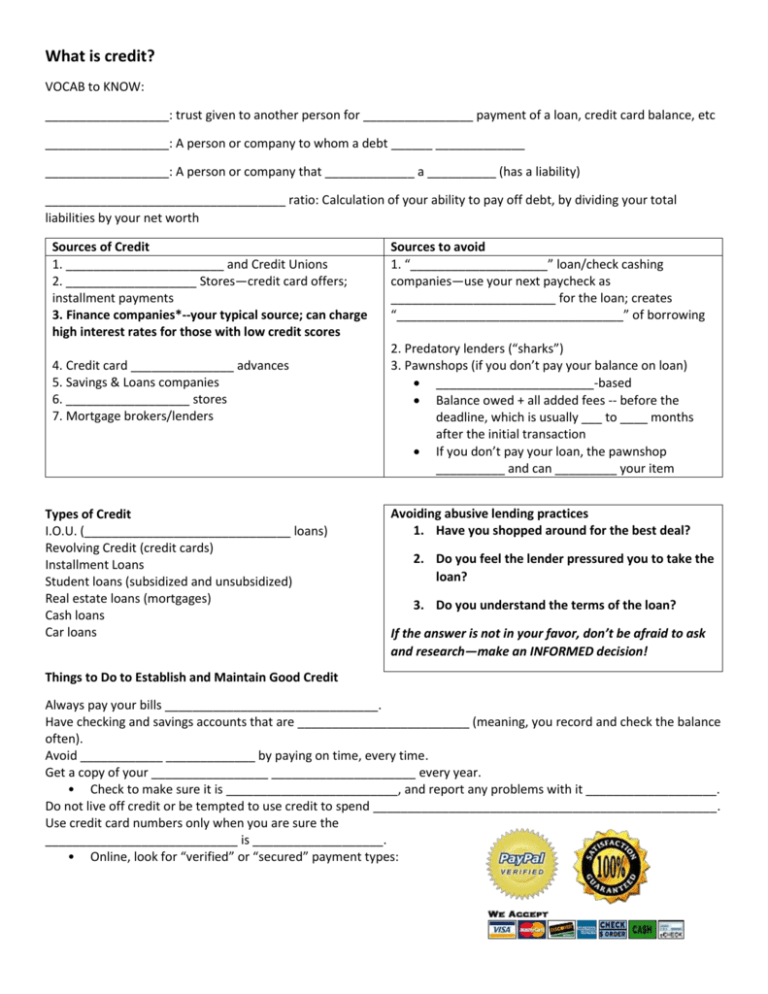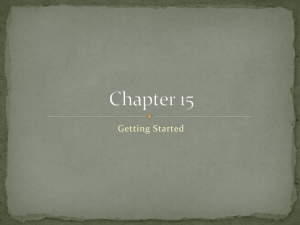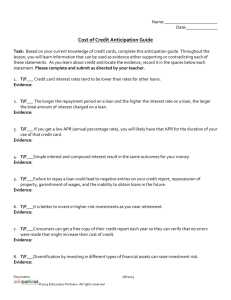What is credit?
advertisement

What is credit? VOCAB to KNOW: __________________: trust given to another person for ________________ payment of a loan, credit card balance, etc __________________: A person or company to whom a debt ______ _____________ __________________: A person or company that _____________ a __________ (has a liability) ___________________________________ ratio: Calculation of your ability to pay off debt, by dividing your total liabilities by your net worth Sources of Credit 1. _______________________ and Credit Unions 2. ___________________ Stores—credit card offers; installment payments 3. Finance companies*--your typical source; can charge high interest rates for those with low credit scores 4. Credit card _______________ advances 5. Savings & Loans companies 6. __________________ stores 7. Mortgage brokers/lenders Types of Credit I.O.U. (______________________________ loans) Revolving Credit (credit cards) Installment Loans Student loans (subsidized and unsubsidized) Real estate loans (mortgages) Cash loans Car loans Sources to avoid 1. “____________________” loan/check cashing companies—use your next paycheck as ________________________ for the loan; creates “_________________________________” of borrowing 2. Predatory lenders (“sharks”) 3. Pawnshops (if you don’t pay your balance on loan) _______________________-based Balance owed + all added fees -- before the deadline, which is usually ___ to ____ months after the initial transaction If you don’t pay your loan, the pawnshop __________ and can _________ your item Avoiding abusive lending practices 1. Have you shopped around for the best deal? 2. Do you feel the lender pressured you to take the loan? 3. Do you understand the terms of the loan? If the answer is not in your favor, don’t be afraid to ask and research—make an INFORMED decision! Things to Do to Establish and Maintain Good Credit Always pay your bills _______________________________. Have checking and savings accounts that are _________________________ (meaning, you record and check the balance often). Avoid ____________ _____________ by paying on time, every time. Get a copy of your _________________ _____________________ every year. • Check to make sure it is _________________________, and report any problems with it ___________________. Do not live off credit or be tempted to use credit to spend __________________________________________________. Use credit card numbers only when you are sure the ____________________________ is ___________________. • Online, look for “verified” or “secured” payment types: When to best use credit 1. In times of emergencies, family crisis, unexpected illness, etc. 2. As convenient way to manage income by keeping track of spending—if bills are paid in full each month 3. Benefit of having large items such as a home, car, and appliances while still paying for them When it’s not best to use credit 1. If you cannot control your own spending Creates fees, compounding interest 2. When credit takes away your needed income, just to pay off your loan(s) Think about wants vs. needs! 3. When there is concern that the credit cards/numbers may be stolen 4. Think about lender reliability and security QUESTIONS TO ASK WHEN APPLYING FOR CREDIT 1. What is the __________________________? 2. What is the ________________________ ___________________ _____________ (APR)? 3. When are ___________________________ due? 4. What is the ___________________________________________ required each month? 5. Is there a ______________ period? 6. Are there other fees associated with the credit, such as minimum finance charges? 7. What is the ________________________________? 8. What are the _______________________ for late or missed payments? 9. What are the terms and conditions of the credit? What else is included in the fine print? Keep in mind: The _________________ the loan period, the _____________ the price of the product purchased on credit (and vice versa) • Less interest is being paid! • Try to avoid paying only the minimum amount due ________________________ on a loan can reduce the time and cost of the loan • Making larger payments than required • Check to make sure there aren’t any fees to do this Your lender can deny loans based on your credit history, credit score, inadequate income, or lack of assets Source: bankruptcy-canada.com/bankruptcy-blog/secured-debts-vs-unsecured-debts-in-bankruptcy-in-canada/ ALWAYS compare interest rates and fees before taking out a loan or applying/using a credit card • Check whether your interest rate is fixed or variable; the total cost is the amount borrowed plus the interest paid over time • Check if/what type of collateral is needed for certain loans (Assets, co-signers…) • What happens if you default?







